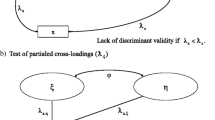Abstract
Many evolutionary models assume that behaviors are caused directly by genes. An implication is that behavioral uniformity should be found only in groups that are genetically uniform. Yet, the members of human social groups often behave in a uniform fashion, despite the fact that they are genetically diverse. Behavioral uniformity can occur through a variety of psychological mechanisms and social processes, such as imitation, consensus decision making, or the imposition of social norms. We present a series of models in which genes code for social transmission rules, which in turn govern the behaviors that are adopted. Transmission rules can evolve in randomly formed groups that concentrate phenotypic variation at the between-group level, favoring the evolution of altruistic behaviors and other group-advantageous traits. In addition, a direct bias toward adopting altruistic behaviors can evolve. Our models begin to show how group selection can be a strong force in human evolution, despite the absence of extreme genetic variation among groups.
Similar content being viewed by others
References
Alexander, R. D. 1987 The Biology of Moral Systems. New York: Aldine de Gruyter.
Axelrod, R., and W. D. Hamilton 1981 The Evolution of Cooperation. Science 211:1390–1396.
Boehm, C. 1996 Emergency Decisions, Cultural Selection Mechanics, and Group Selection. Current Anthropology 37:763–793.
1997 The Impact of Egalitarian Behavior on Darwinian Selection Mechanics. American Naturalist 150:s100-s121.
Boyd, R., and P. J. Richerson 1985 Culture and the Evolutionary Process. Chicago: University of Chicago Press.
1987 Simple Models of Complex Phenomena: The Case of Cultural Evolution. In The Latest on the Best: Essays on Evolution and Optimality, J. Dupre, ed. Pp. 27–52. Cambridge: MIT Press.
1990 Group Selection among Alternative Evolutionarily Stable Strategies. Journal of Theoretical Biology 145:331–342.
1992 Punishment Allows the Evolution of Cooperation (or Anything Else) in Sizable Groups. Ethology and Sociobiology 13:171–195.
Flinn, M. V. 1997 Culture and the Evolution of Social Learning. Evolution and Human Behavior 18:23–67.
Giddens, A. 1994 Central Problems in Social Theory: Actions, Structure and Contradiction in Social Analysis. Berkeley: University of California Press. (originally published in 1979)
Hamilton, W. D. 1964 The Genetical Evolution of Social Behavior, Parts I and II. Journal of Theoretical Biology 7:1–16, 17–52.
Joseph, A., R. B. Spicer, and J. Chesky 1949 The Desert People: A Study of the Papago Indians. Chicago: Chicago University Press.
Lakoff, G., and M. Johnson 1980 Metaphors We Live By. Chicago: University of Chicago Press.
Murdock, G. P. 1967 Ethnographic Atlas. Pittsburgh: University of Pittsburgh Press.
Naik, T. B. 1956 The Bhils: A Study. Delhi: Bharatiya Adimjati Sevak Sangh.
Shternberg, L. I. 1933 The Gilyak, Orochi, Goldi, Negidal, Ainu; Articles and Materials. Khabarovsk: Dal’giz.
Simon, H. 1990 A Mechanism for Social Selection and Successful Altruism. Science 250:1665–1668.
Sober, E., and D. S. Wilson 1998 Unto Others: The Evolution and Psychology of Unselfish Behavior. Cambridge: Harvard University Press.
Turnbull, C. M. 1965 The Mbuti Pygmies: An Ethnographic Survey. New York: American Museum of Natural History.
Wilson, D. S. 1975 A Theory of Group Selection. Proceedings of the National Academy of Sciences 72:143–146.
1998 Hunting, Sharing and Multilevel Selection: The Tolerated Theft Model Revisited. Current Anthropology 39:73–97.
Wilson, D. S., and E. Sober 1994 Reintroducing Group Selection to the Human Behavioral Sciences. Behavioral and Brain Sciences 17:585–654.
Witte, E., and J. H. Davis, eds. 1996 Understanding Group Behavior. Mahwah, New Jersey: Erlbaum.
Wright, S. 1945 Tempo and Mode in Evolution: A Critical Review. Ecology 26:415–419.
Author information
Authors and Affiliations
Corresponding author
Additional information
David Sloan Wilson is an evolutionary biologist interested in a broad range of issues relevant to human behavior. He has published in psychology, anthropology, and philosophy journals in addition to his mainstream biological research. With philosopher Elliott Sober, he is author of Unto Others: The Evolution and Psychology of Unselfish Behavior (Harvard University Press, 1998).
Kevin M. Kniffin is a doctoral student in the Department of Anthropology at SUNY-Binghamton. His M.A. thesis, entitled “The Selfish Teams: Richard Dawkins’ Rowing Metaphor Revisited” (1998), explores the levels-of-selection debate in the context of three original experiments aimed at addressing evolutionary psychologists’ work on physical attractiveness, previous work on the various function(s) served by language, and the degree to which group experiences can or cannot change a person’s attitudes toward individualism and collectivism. His dissertation research will test the effects of social change on biological stress markers.
Rights and permissions
About this article
Cite this article
Wilson, D.S., Kniffin, K.M. Multilevel selection and the social transmission of behavior. Hum Nat 10, 291–310 (1999). https://doi.org/10.1007/s12110-999-1005-x
Received:
Accepted:
Issue Date:
DOI: https://doi.org/10.1007/s12110-999-1005-x




